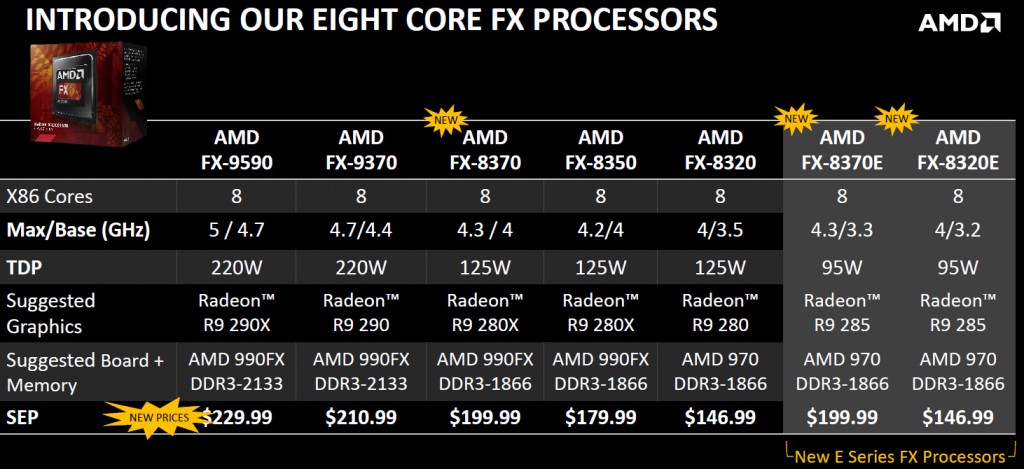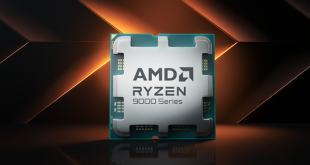Advanced Micro Devices on Tuesday introduced three new AMD FX microprocessors for enthusiasts and slashed prices of existing high-end products. The move will make the FX-series chips slightly more competitive than they are today, but will hardly radically improve AMD’s positions on the market of central processing units.
Three new AMD FX chips are the FX-8320e (eight-cores, 3.20GHz/4GHz frequency, 16MB cache, 95W TDP), the FX-8370e (eight-cores, 3.30GHz/4.30GHz frequency, 16MB cache, 95W TDP) and the FX-8370 (eight-cores, 3.30GHz/4.30GHz frequency, 16MB cache, 125W TDP). The new processors are not as fast as the code-named “Centurion” FX-9590 or FX-9370, but they are compatible with regular AM3+ mainboards. Moreover, the new AMD FX E-series processors feature 95W thermal design power, which makes them useful for systems in smaller form-factors.
All new AMD FX microprocessors are based on the code-named “Vishera” design and the Piledriver micro-architecture. The chips are made using 32nm SOI process technology at GlobalFoundries do not differ significantly from CPUs launched almost two years ago. Still, keeping in mind that GlobalFoundries’ 32nm process technology might get a little bit better than it was in 2012, it is imaginable that new chips offer better overclocking potential.
Separately, AMD also slashed prices on virtually all FX processors. The most expensive model – the FX-9590 – now costs $229 in retail and $199 in mass quantities. The most advanced mainstream model – FX-8370/FX8370e – is priced at $199 in retail and at $189 in mass quantities. AMD positions its FX-series chips as competitors for Intel’s Core i5 and Core i3 processors. The company does not plan to fight Intel’s Core i7 offerings with its FX-series products.
Discuss on our Facebook page, HERE.
KitGuru Says: Keeping in mind that AMD does not want to compete against Intel’s “Devil’s Canyon” offerings, it is pretty obvious that the new models and prices will hardly improve popularity of the FX line up among enthusiasts who always want higher performance. Those, who want to have truly high performance will probably stick to Intel’s Core i7 “Devil’s Canyon” or even “Haswell-E” chips. Those, who want to have PCs with decent performance, but do not want to use expensive mainboards and cooling systems will not get the FX-9000 “Centurion” products. Meanwhile, the regular FX-8300-series chips are not popular among customers or system makers in general because of moderate performance and and two years of availability (those, who wanted an FX-8300-series chip have probably got one already). Perhaps, only 95W models will pose interest to those, who want to have a low-power AMD-based systems with maximum performance that AMD has to offer… Anyway, stay tunes for a fully-fledged review of the new AMD FX chips.
 KitGuru KitGuru.net – Tech News | Hardware News | Hardware Reviews | IOS | Mobile | Gaming | Graphics Cards
KitGuru KitGuru.net – Tech News | Hardware News | Hardware Reviews | IOS | Mobile | Gaming | Graphics Cards




Come on AMD.. New architecture isn’t all that expensive to engineer after two years..
Plus, it would sell, a lot, I guarantee it.
I agree. I think the AMD A-series are great. But the should streamline the FX series and introduce an enthusiast line to compete with the i7.
I just have one question. Why is the fx-8370E the same price as the fx-8370? Am I missing something here, because all I’m seeing is an underclocked part for the same price as an overclocked one. If you know why it’s priced that way, please let me know.
There’s also the TDP difference
At present the AMD roadmap doesn’t really feature any attempts to compete with the higher intel ranges, I think that would come around 2015 or most likely 2016. They’re going to finish getting rid of the FX range and then with DDR4, hit the new architectures. They’re also working hard on their APU line, which is improving lots with each revision, so that could provide strong competition at certain price points in the future